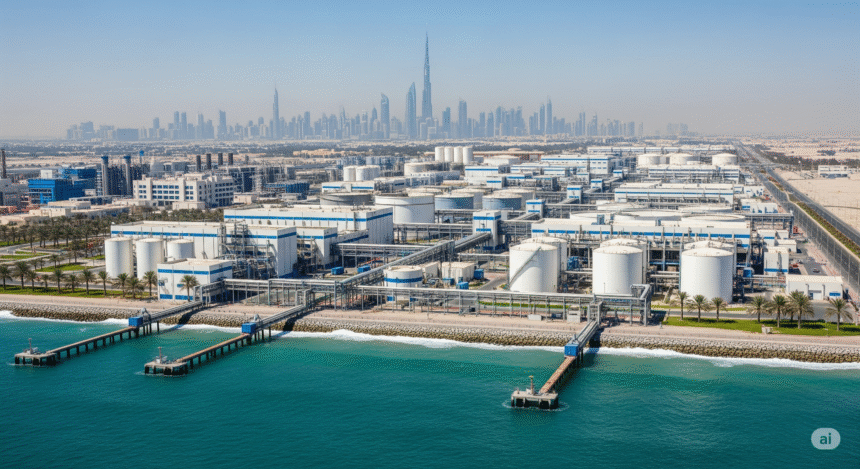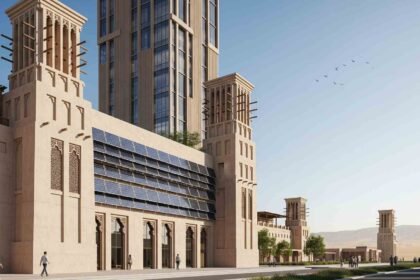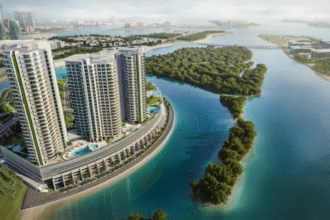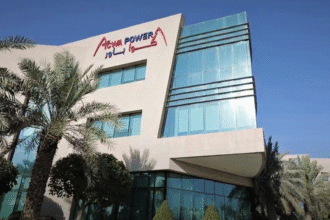PowerChina has been awarded a contract valued at roughly $4 billion to construct Iraq’s first large‑scale seawater desalination plant in the southern city of Basra. The Chinese state-owned firm will partner with the Iraqi Al-Ridha Group in this landmark venture, which is seen as a cornerstone in Iraq’s efforts to tackle critical water scarcity in the region.
Project Launch and Political Endorsement
A formal commissioning ceremony took place on July 24, 2025, attended by Iraqi Prime Minister Mohammed Shia al‑Sudani and senior officials. The event is the official start of construction on a site in the Basra governorate. During the event, the Prime Minister emphasised the urgent need to resolve Basra’s long‑standing water crisis through dependable and sustainable infrastructure.
Technical Overview of the Plant
Stretching out across the coast near the Al‑Faw Grand Port development zone, the desalination plant will feature three parallel reverse‑osmosis lines, each capable of treating 335,000 cubic metres of seawater per day, for a combined capacity of approximately 1 million cubic metres per day. This scale makes it the largest of its kind in Iraq and among the largest in the region.
Supporting the facility will be a 300 megawatt captive power station, built on site to ensure an uninterrupted supply of electricity for desalination operations and local use.
Additionally, a 240‑kilometre pipeline network will distribute potable water to nine major distribution centres across Basra province, helping reach both urban and rural communities that have lacked safe water access for generations.
Why this Project?
Basra and its surrounding region have faced persistent water stress due to dwindling flows in the Tigris and Euphrates rivers, seawater intrusion into the Shatt al‑Arab waterway, rainfall deficits, and ageing infrastructure. Experts have warned that Iraq’s renewable water reserves are now dangerously low, far below national consumption levels.
Periodic public protests in Basra have called attention to water shortages, poor sanitation, and related health issues. The plant is expected to offer a reliable, clean water supply and substantially reduce reliance on increasingly saline river water.
Timeline and Operational Readiness
Construction is already under way as of late July 2025. According to plans announced by the Iraqi Prime Minister’s Office, the desalination plant is scheduled to begin commercial operation in June 2028. The timeline includes completion of desalination systems, energy supply facilities, pipelines, and local distribution nodes.
Meanwhile, smaller scale desalination units will be installed in advance in select districts. These interim systems (such as Shatt al‑Arab with 5,000 m³/hour capacity, Al‑Faw and Al‑Siba at 3,000 m³/hour, and Safwan with 1,000 m³/hour) aim to relieve urgent shortages while the mega‑plant is under construction.
Partnership Dynamics
The contract was awarded to a consortium of Al‑Ridha Group and PowerChina. The Iraqi Cabinet had authorised Basra’s governor to negotiate the framework agreement with this coalition in March 2024. Those early negotiations covered design, surveys, feasibility studies, and tender preparation, all overseen in coordination with ILF Consulting Engineers, an Austrian firm handling consulting services for the project.
This arrangement allowed the project to progress without binding financial obligations for Basra province at the early stage. The federal government will consider formal approval after detailed studies and plans are submitted.
Regional Experience of PowerChina
PowerChina brings relevant regional experience. It has completed multiple large desalination projects in the Middle East, including the Taweelah plant in Abu Dhabi (capacity 900,000 m³/day), Rabigh Phase 3 and the Jubail plant in Saudi Arabia (each around 600,000 m³/day).
By leveraging its expertise in clean‑water engineering, reverse osmosis systems, and independent power generation, the firm is well‑placed to deliver on the massive scale required in Basra.
Challenges and Outlook
Executing a project of this scale in a region with unstable water resources and environmental stresses is not without risks. Ensuring timely delivery of infrastructure, managing costs, environmental safeguards, and coordinating with local authorities will all be critical for success. Iraq’s water shortages, pollution levels, and public expectations will test the resilience of the plan.
Yet, if implemented on schedule, the plant could change life for millions in southern Iraq. Reliable desalinated water will support public health, agriculture, and industrial activity, while reducing dependence on fragile river sources.
The $4 billion Basra seawater desalination project, led by PowerChina and Al‑Ridha Group, represents an unprecedented investment in Iraq’s water infrastructure. With first operations expected in June 2028, and interim stations already alleviating shortages, the initiative offers a transformative path toward securing potable water for 3 to 4 million residents in Basra province.
Aligned with Iraq’s broader efforts to modernise utilities and restore public trust, this venture combines regional engineering experience, dedicated power infrastructure, and long pipeline networks under one unified design. When it is completed, it may stand as one of the most ambitious and essential public works projects in modern Iraqi history.







